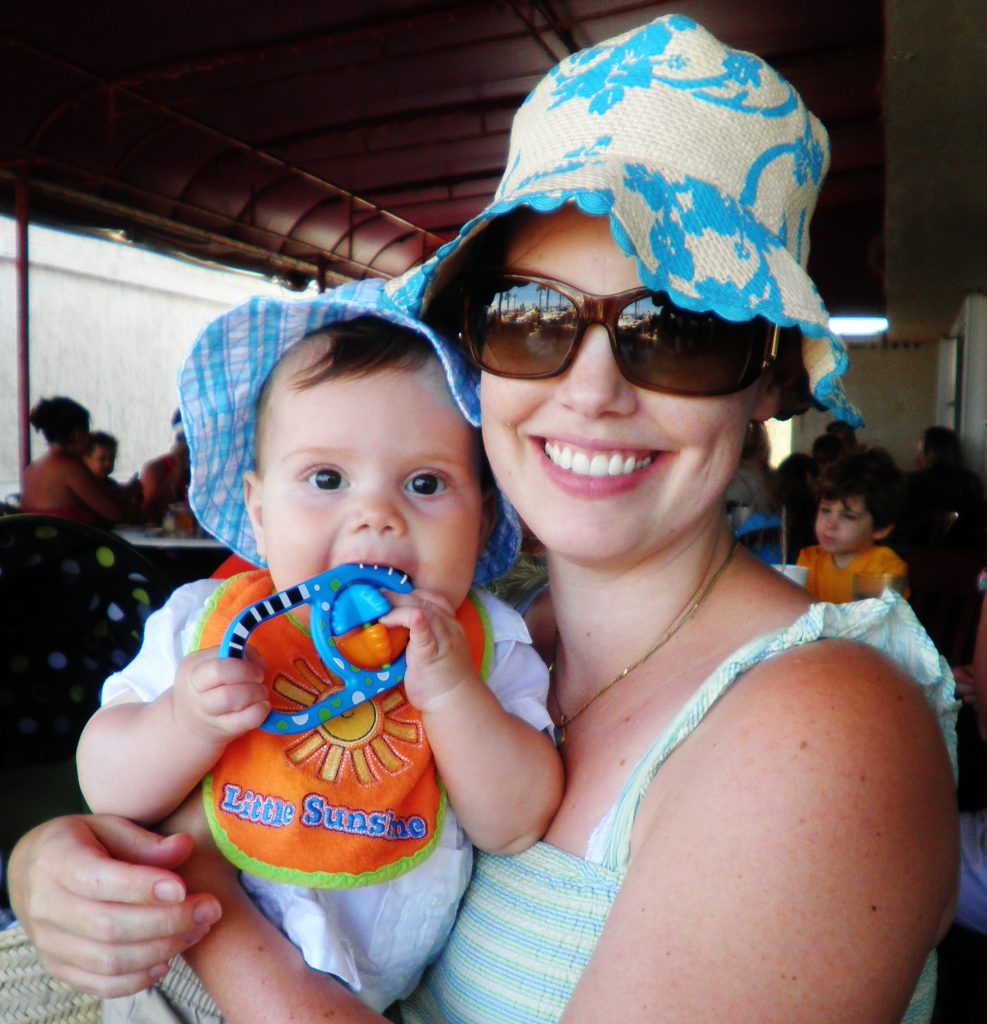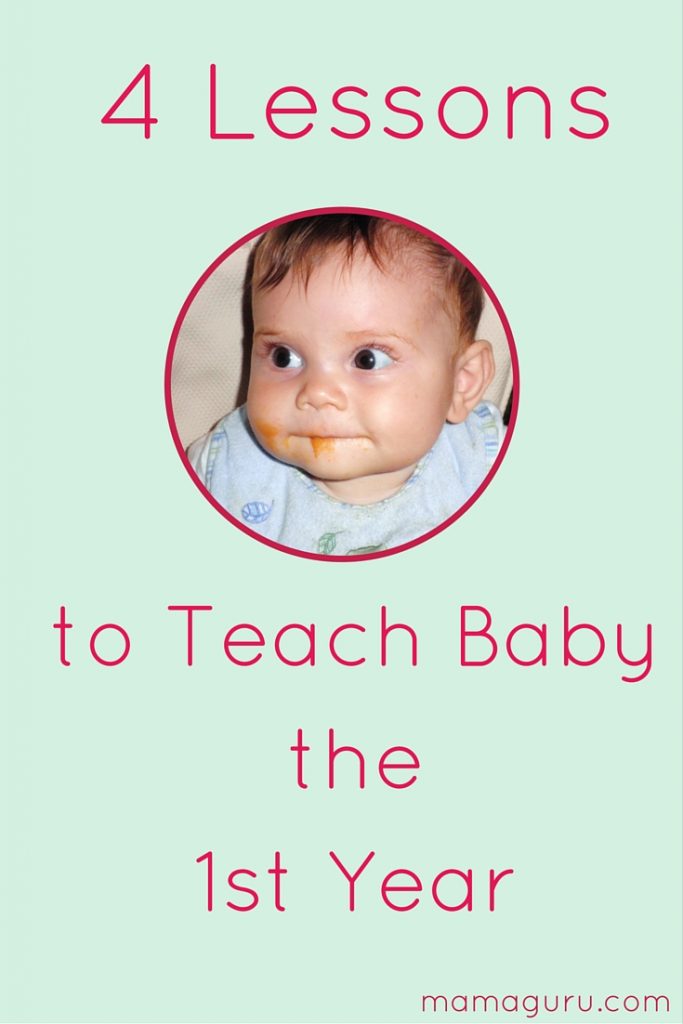Congratulations! You have a new baby.
All you have to do now is teach him EVERYTHING. Baby’s first lessons come from Mommy.
Overwhelmed? Don’t be. You have a lot of time to do it. Here’s a good place to start. These are the four crucial things for baby to learn during his or her first year of life, including when and how to teach him.
1. You are loved and your needs will always be met.
0~3 months
The most important thing every newborn needs to know is that they are loved and safe. The way to teach them this is by being a responsive parent. When baby cries, respond right away. Mothers are hard-wired to do this and a cascade of stress hormones are released into a new mother’s body when her infant cries to help motivate her. In past generations it was common to gruffly tell a new mom to let the baby “cry it out, so he can learn.” Numerous studies have actually shown the opposite to be true. It makes sense: in order to build a sense of security, baby needs to feel secure that his needs will be met. The repetition of a responsive parent teaches baby that he will always be taken care of, a crucial first life lesson. Feeding on-demand, frequent diaper changes, and numerous cuddles are par for the course during the first three months.
Here’s a nugget of wisdom from my mom that really helped me when Max was a newborn and I was exhausted and unsuccessful in calming him down. She said, “Part of the bond between mother and child is that they get to know you’re always there for them. Even if you can’t solve his problem in the moment, he knows that he’s not alone. There’s someone in there with him, and that does help.” See where I get my guru from? Thanks, Mom.
2. You are OK when you are by yourself.
3~6 months
This next lesson is really important to institute as soon as possible. Imagine how scary life would be if you panicked every time you were left alone? Teach baby that mama is always there for him, even if she isn’t always with him. Of course, babies are still small and needy at this age, but fostering a bit of independence is good for everyone. Start out small by setting up a child-proofed play area. Set baby up with a soft gym or an interesting toy. Once baby is engaged, back away. Do this often, always returning with a smile when baby signals that he’s done. This teaches baby two things: he can play by himself and mama is always there when he needs her. This doesn’t mean you shouldn’t also play together, but do allow for independent playtime at an early age.
It is also good to start distinguishing between fussing and crying at this point. Newborns are not at all shy about shrieking their needs to all within earshot. Older babies have a few more sounds in their repertoire. The fire-alarm screams do signal a need for an immediate response, but whiny, fussy, pouty sounds don’t necessarily need anything. Give baby a few minutes to work out whatever is bothering him before leaping in to the rescue. Besides giving mom a much needed break, this gives baby the opportunity to learn to comfort himself, an invaluable life skill. Many a new mother rushes in to respond to the smallest sound and ends up waking a baby who was just mumbling as he changed positions. Sometimes baby will fuss and complain for a few minutes and then fall back asleep or discover a way to entertain himself. Other times fussing will escalate and you can step in to help him. Allowing baby the chance to play and comfort himself as he is able to will help him become more secure and better able to be happy on his own.
3. You can fall asleep on your own.
6~9 months
Between three and four months, baby is biologically capable of sleeping through the night. If your baby has hit the six month mark and is still either waking up multiple times a night on a regular basis or unable to fall asleep without being nursed or rocked, it’s time to offer some guidance. Again, this is a life skill baby needs. If you teach it early, it’s easy to learn. The longer you wait to teach baby this lesson, the harder and more traumatic it will be to learn it. I wrote a whole post about fostering good sleep habits, so please check it out if you need some tips.
Sometimes babies who have slept through the night suddenly stop due to teething, growth spurts, or simply because they want company when they wake-up. Growth spurts and teething last only a few days, but if your baby continues to wake up and call out for you to help him sleep, it is time for him to learn how to fall asleep on his own. It is OK to have a different expectation for a six month old than you do for a newborn. A little firmness can provide some much needed guidance, which is an act of love. After six months, don’t respond to any fussing sounds during sleep times. Give baby a chance to try to settle himself. If fusses escalate to crying, you can try to soothe baby, but do as little as possible. Reassuring words or a light back rub are better choices than picking up baby. As soon as he calms, exit, even if that means you have to go back in shortly. It teaches baby that although he’s not abandoned, he will have to learn to sleep on his own.
If baby is particularly attached to one parent, it’s probably a good idea for the other parent to respond to nighttime cries. We had to do this with Jack who decided that every time he woke up, he’d like to see mama even though he hadn’t fed at night for two months. I would respond to his cries and find him smiling in his crib, happy to see me. This got old pretty fast. Eventually we decided that Daddy would go to him from 7 pm to 7 am. Daddy didn’t have the same marshmallow disposition as me, but he is loving parent. It took us two nights of no mama for Jack to realize that we would not be visiting during the night. We still hear him wake occasionally, but he talks himself back to sleep unless he has a real problem, in which case we are happy to help him.
4. Your life is predictable.
9~12 months
Babies thrive under routines. Keeping a regular schedule creates a secure environment for baby. Their biorhythms set to their schedule so that their needs are always met. They get hungry before mealtimes and sleepy before naps. This is also a time when baby is actively trying to make sense of the world. Consistency in their life allows they to know that they will be taken care of, as well as allowing them to anticipate what happens next. A baby who has a predictable schedule will eventually crawl to his highchair for lunch or point to the door before outdoor play. Knowing what will happen next opens the door for baby to participate in family life and demonstrate the connections his brain is making.
If you have taught your baby these lessons by the time he turns one year old, you have a secure and happy child on your hands. You will also feel pretty confident as a mother, enjoying a strong loving bond with your child, as well as a taste of independence for you both. Time to light that #1 candle and eat some cake!








Thanks for you comment and happy birthday to your daughter! You’re absolutely right; every child has his or her own quirks and rhythms. Mindful parents experiment and find out what works best for their family. Take care!
We just celebrated that happy year! Every baby is different in how they respond to things but these are definitely great. With my daughter if she cried at night going in created hours of screams but we managed to find our rhythm. Thanks for this post.
Beautiful site very informative thank-you very much.. Would like to know more on baby skills development
Thanks for your question, Masha.
I strongly believe that the most important thing for a baby to know is that he or she is loved and always has his or her needs met. Babies can’t possibly get too much attention or interaction. Ideally they get that from their parents or grandparents. If that just isn’t possible, a daycare with a low ratio of caregivers to children which also has a very nurturing environment is key. The notion of “spoiling” a baby by giving too much attention is simply not true. No amount or kinds of toys can make up for loving human interaction. In fact, my babies only had a basket full of toys the first year of their life. They had soft play gyms and a jumperoo, but most of their time was spent making faces with me or going on outings. Once a baby becomes a toddler, it is a good idea to foster independent play, which is something that naturally happens. I say, trust your instincts and never leave your child in a place full of unhappy children. Babies might not be able to speak, but they do communicate how they feel. Good luck.
Hi, this is very nicely put! I would just like to ask for your opinion on daycare and babies. I live in Belgium where the daycare is the norm, from the time babies are 4 months old. I almost out my 7 m old son in one but was appalaed by wht I saw- babies crying a lot, passivley lying in bouncers, with only their basic needs being met. People here try to assure me that there are better daycares and that babies in general should be left often to play by themselves. I tend to believe that a baby, although should learn autonomy, cannot really play alone with toys-no matter how great these tosy are- for a long period. and also, that babies naturally need their mother close by. but here, they say it all depends on the quality of care and the caregivers and that babies are ok for longer periods without their mums. what is your take on this? Thanks
You’re very welcome, Melinda. I appreciate your kind words and encouragement.
Thank you for these great tips! You have developed a lovely site:)